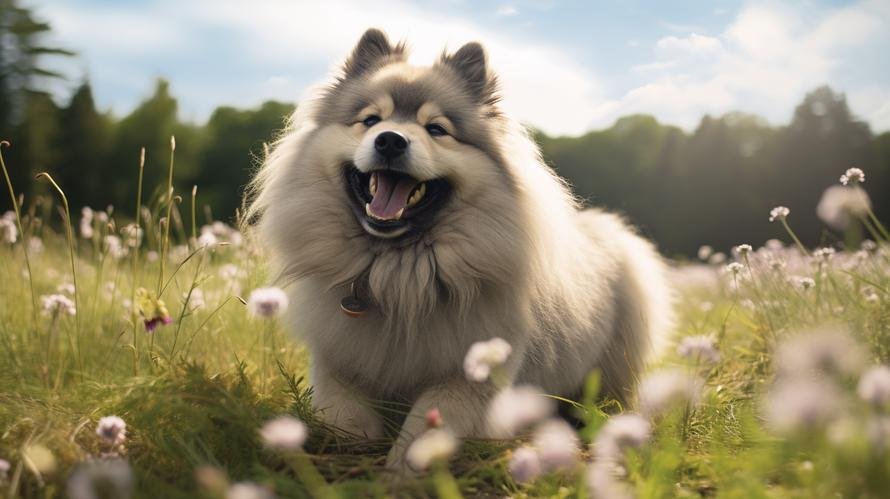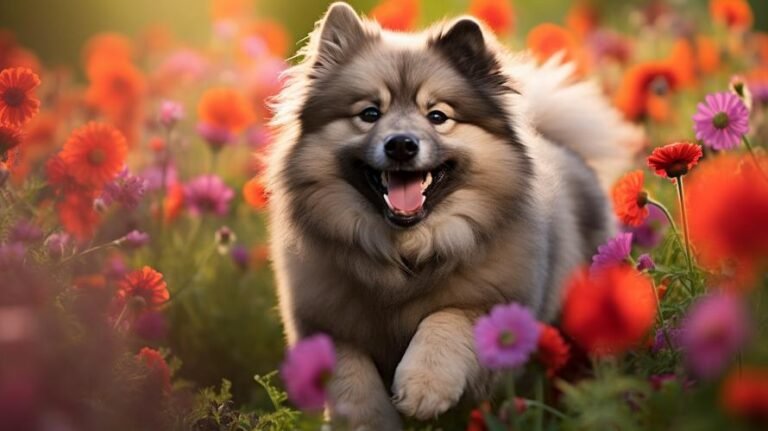Imagine, if you will, a furball of joy so fascinating and entertaining, that it almost seems like a teddy bear playfully springing to life. With a distinctive, lion-like mane around its neck and shoulders, bushy, curled tail resting distinctly over its back, and sparkling expressive eyes that seem to talk, the sight is adorable beyond words can pronounce. That is a Keeshond (pronounced – KAYZ-hawnd) for you. This medium-size Dutch dog breed, with an effervescent spirit, is often hailed as the ‘people’s dog.’ But the pertinent question remains – how healthy is the Keeshond?
Dutch for ‘dog of the people,’ Keeshonds are known for their playful, happy-go-lucky, yet sensitive nature that seemingly portrays them as ‘children in a dog suit.’ Originally developed in the Netherlands to guard barges and maintain a lively companionship, the Keeshond is often considered one of the healthiest breeds. However, as a responsible Keeshond parent or prospective owner, it’s crucial to understand and explore more about its health.
It’s remarkable to learn that Keeshonds have an average lifespan of 12-15 years, living a few years longer than many other breeds their size, exemplifying their strength and vitality. However, the breed is predisposed to certain inherited health issues that one needs to be aware of for preventive care.
Firstly, Hip Dysplasia is a common skeletal condition often identified within the breed. This condition can limit the full range of motion of the hips, causing stiffness, pain, and ultimately, osteoarthritis if not addressed promptly. The good news, however, is with advancements in veterinary science, there are multiple treatment options available depending on the condition’s severity, from physical therapy and anti-inflammatory medications to surgical options.
Another significant concern in Keeshonds is Progressive Retinal Atrophy (PRA), an inherited disease of the retina that could gradually lead to blindness. Therefore, it’s advised to get annual eye exams done for your Keeshond from an early age to detect any signs of PRA.
Similarly, Hypothyroidism – a condition where the thyroid gland does not produce enough thyroid hormone, leading to issues like hair loss, weight gain, dry skin, and lethargy, is also prevalent in this breed. Hypothyroidism is controllable via medication supervised by a veterinarian.
Patellar Luxation, a condition wherein the kneecap dislocates or moves from its proper place resulting in lameness, is another notable health concern that affects Keeshonds. Again, treatments range from supportive care like physical therapy and non-steroidal anti-inflammatory drugs (NSAIDs) to surgery for severe cases.
Addison’s Disease, a disorder wherein the adrenal gland produces insufficient amounts of steroid hormones, can also affect Keeshonds. It can result in lethargy, muscle weakness, low heart rate, and skin discoloration. Although it cannot be cured, Addison’s disease can be managed effectively with the right medication and diet.
However, the mere present of these potential health problems does not mean that your Keeshond will inevitably suffer from them. A responsible breeder’s work is to screen their breeding dogs for health conditions and strive to produce the healthiest puppies possible. Hence, if you’re considering adopting or buying a Keeshond, ensure that you choose a reputable breeder who can provide health clearances for both puppy parents. Moreover, opt for regular, preventive veterinary healthcare and a balanced diet to keep your Keeshond in the peak of health.
It’s also important to maintain your Keeshond’s mental health. Keeshonds are smart, quick learners who cherish mental stimulation. Boredom can lead to destructive behavior or even depression in this breed. Regular exercise, plenty of playtimes, and mental games are just as critical in promoting a healthy, happy life for your Keeshond.
To sum it up, the Keeshond is generally a healthy breed with a relatively long lifespan compared to other breeds of a similar size. However, like all breeds, they can be prone to certain health issues. Regular check-ups, a balanced diet, regular exercise, and mental stimulation will go a long way in ensuring your Keeshond’s health is the best it can be. After all, a healthy Keeshond is a happy Keeshond and undoubtedly a joy to behold.
Remember, longevity isn’t just about the count of years; it’s about the quality of those years that you and your Keeshond get to spend together. Thus, taking care of your Keeshond’s health equals investing in countless memories interspersed with moments of life’s greatest joys and laughter. As a Keeshond owner, you’ll agree – there’s no better reward than a vibrant, fur-bouncing Keeshond sprinting towards you full of health, happiness, and unconditional love!



